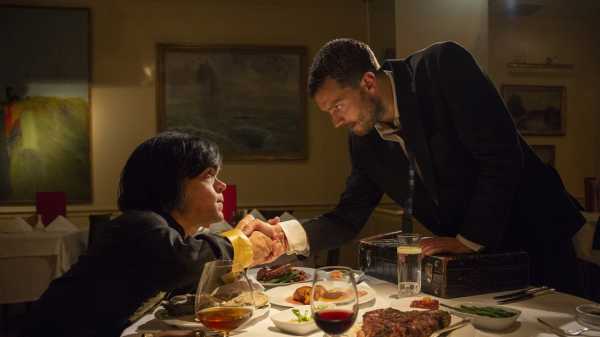
“My Dinner with Hervé” (HBO) is a bio-pic about a short actor who met a bad end, framed by the story of a magazine writer inspired toward self-realization by his subject. Peter Dinklage plays Hervé Villechaize, who died, in 1993, of a self-inflicted gunshot wound. Villechaize became famous playing Tattoo, the sidekick to Ricardo Montalbán’s Mr. Roarke on ABC’s “Fantasy Island.” His profiler is a London journalist named Danny Tate (Jamie Dornan), a Grub Street pub demon invented by the writer-director Sacha Gervasi. In reality, it was Gervasi himself who conducted a long and emotionally wrought valedictory interview with Villechaize not long before his suicide; onscreen, his stand-in is a lost boy who is redeemed after entering the star’s gravitational field.
Tate touches down in Los Angeles with orders from his sharp-tongued editor (Harriet Walter) to interview Gore Vidal for a cover story. Me, I would have waited until Vidal had repaired to his Italian villa to schedule the sit-down, for the sake of expensing a reporting trip to the Amalfi Coast. But Tate has a thirty-day sobriety coin burning a hole in his pocket, and he’s in a desperate hurry. His young family has slipped from his grasp, and he clings to his job with trembling hands. Needing to prove himself, he agrees, during the L.A. visit, to tack on an interview with Villechaize. “Make it funny,” his editor says.
Meeting Villechaize, Tate incuriously sets his microcassette recorder before a three-foot-eleven-inch egotist who gasses on long enough to make him late for his appointment with Vidal. (My long-standing hope that someone, sometime, will make the obvious move of casting Frank Langella as Vidal remains frustrated, but Michael Elwyn emits a fine hauteur in the part, and his creamy turtleneck and silver-buttoned double-breasted blazer is on point.) Offended by Tate’s tardiness, Vidal abandons the interview and glides away, stranding the reporter between the tinkling temptations of his minibar and the insistent goading of Villechaize to stay out all night. Tate lugs a shabby briefcase bearing a file of clips and a few persistent specks of dignity; Villechaize totes a Samsonite train case rattling with pill bottles while wearing a purple T-shirt printed with the phrase “bionic midget.” The relationship has the flavor of a hostage situation: in the back of a limo, the actor badgers his captive audience into serving as the unwitting amanuensis of a suicide note.
The story of Villechaize’s life—rearranged to maximize its simplicity as both a show-biz roller-coaster ride and an allegory of toxic celebrity—is of physical difference and social distance fuelling ambition on the way up and stoking dissipation on the way down. He recounts his upbringing, in Paris, by parents whose distress at his dwarfism edged into cruelty; in the storehouse of his memories lies the rosebud of his mother’s withheld love. Villechaize found early success as a painter, but he left for America after being assaulted on the street by punks who coveted his girlfriend. There’s a pithy theory of the Other couched within rhetorical questions. “Why hate yourself when you can hate me?” Villechaize asks.
Ostracized as a “freak,” Villechaize ran off to join the freak show. He gained notice as a James Bond villain in “The Man with the Golden Gun” (as Nick Nack, who is like Oddjob on the scale of Mini-Me) and became a household name with “Fantasy Island” (which, with its anthology format and supernatural gist, stands among Aaron Spelling’s finest work—a noonday “Twilight Zone”). “Ze plane! Ze plane!” was his imprisoning catchphrase. Dinklage’s rendition of Villechaize’s zesty voice suggests an impression of Javier Bardem performed by a dance-hall accordion.
The power of fame proves corrupting, and the movie begins a familiar bio-pic dig through wreckage caused by compensatory narcissism, self-medicating gluttony, and diva tantrums tossed in the shadow of the Hollywood sign. As the arc of the career sinks into a downward slide, the story line goes sketchy in its rush to hit the beats, the realizations that “you cannot make someone love you,” and all that. The actor was only married to his second wife for fifteen months, true, but her divorce lawyer has more lines than she does.
Dinklage catches the character’s anger, self-pity, and, most importantly, his exuberant recklessness, as when vaingloriously yapping at Montalbán (Andy Garcia), pulling a knife to seek the representation of an agent (David Strathairn), and indulging in a red-carpet wrestling match with Billy Barty, who had scolded the upstart to show some class. “My Dinner with Hervé” cannot make a straight-faced claim that Villechaize was an important actor or significant cultural figure, so its own significance depends on the star’s charisma, which lends the proceedings a simple poignance. Some people failed to see Villechaize as a full person, and often, he himself was among them.
Sourse: newyorker.com






